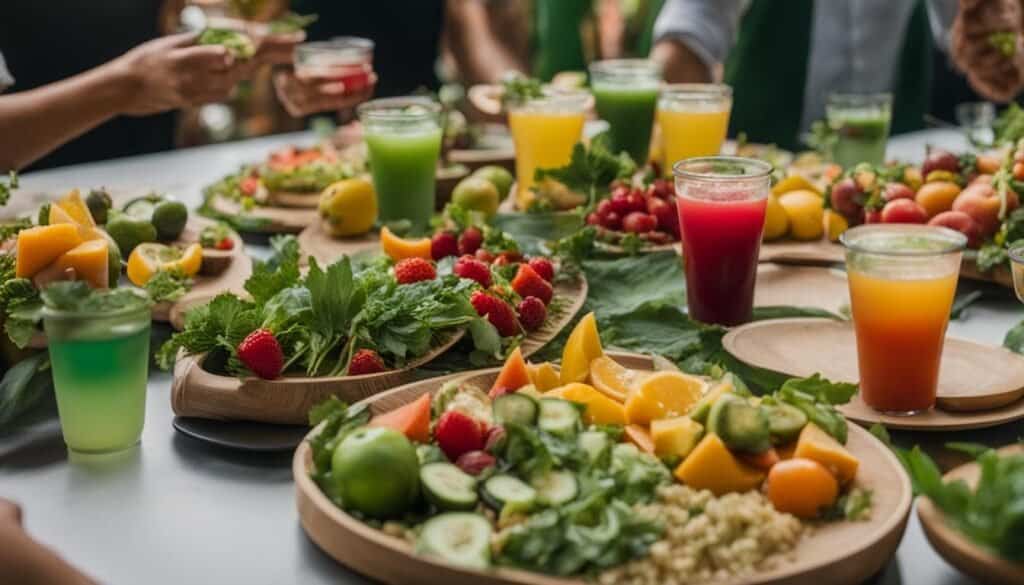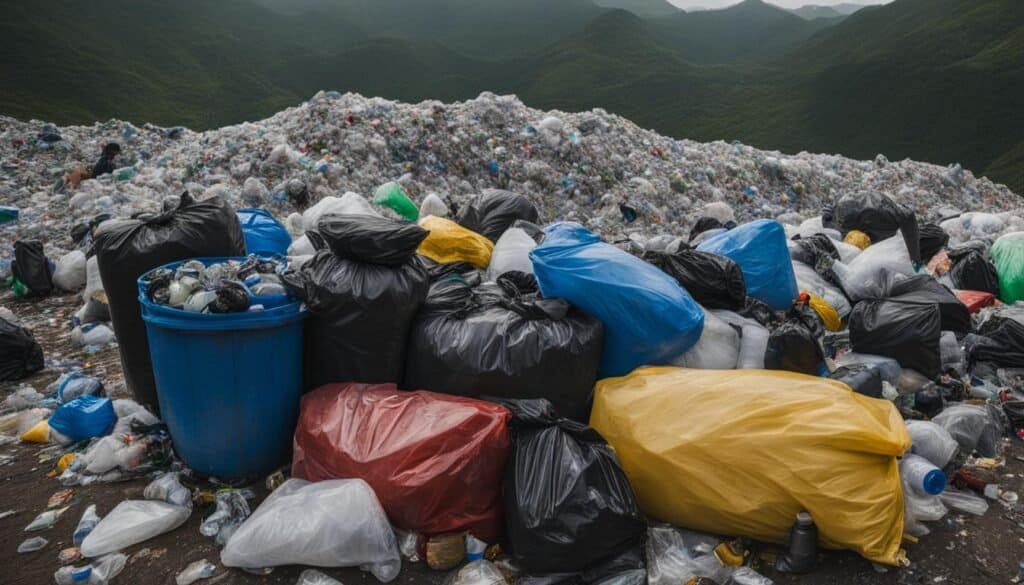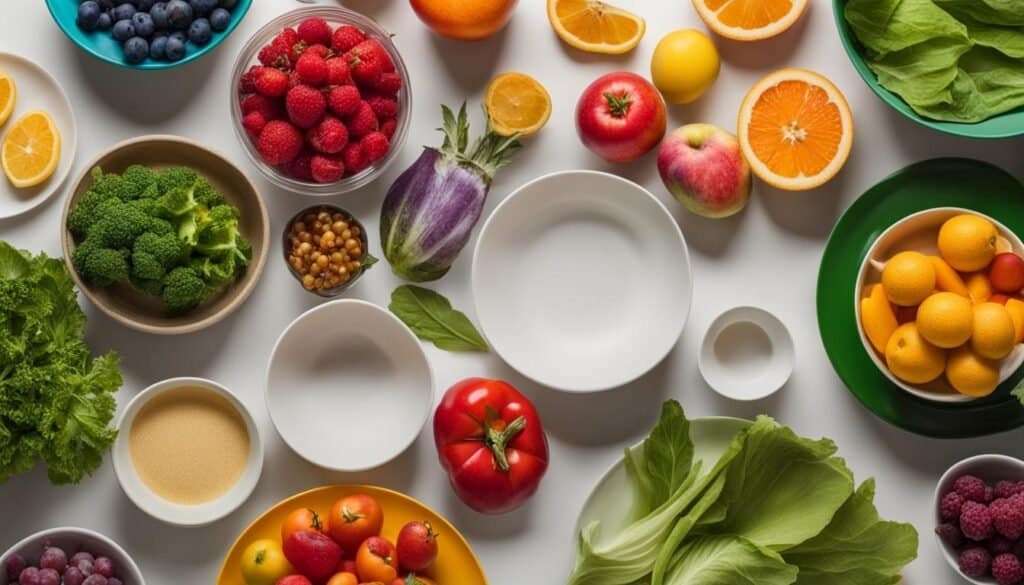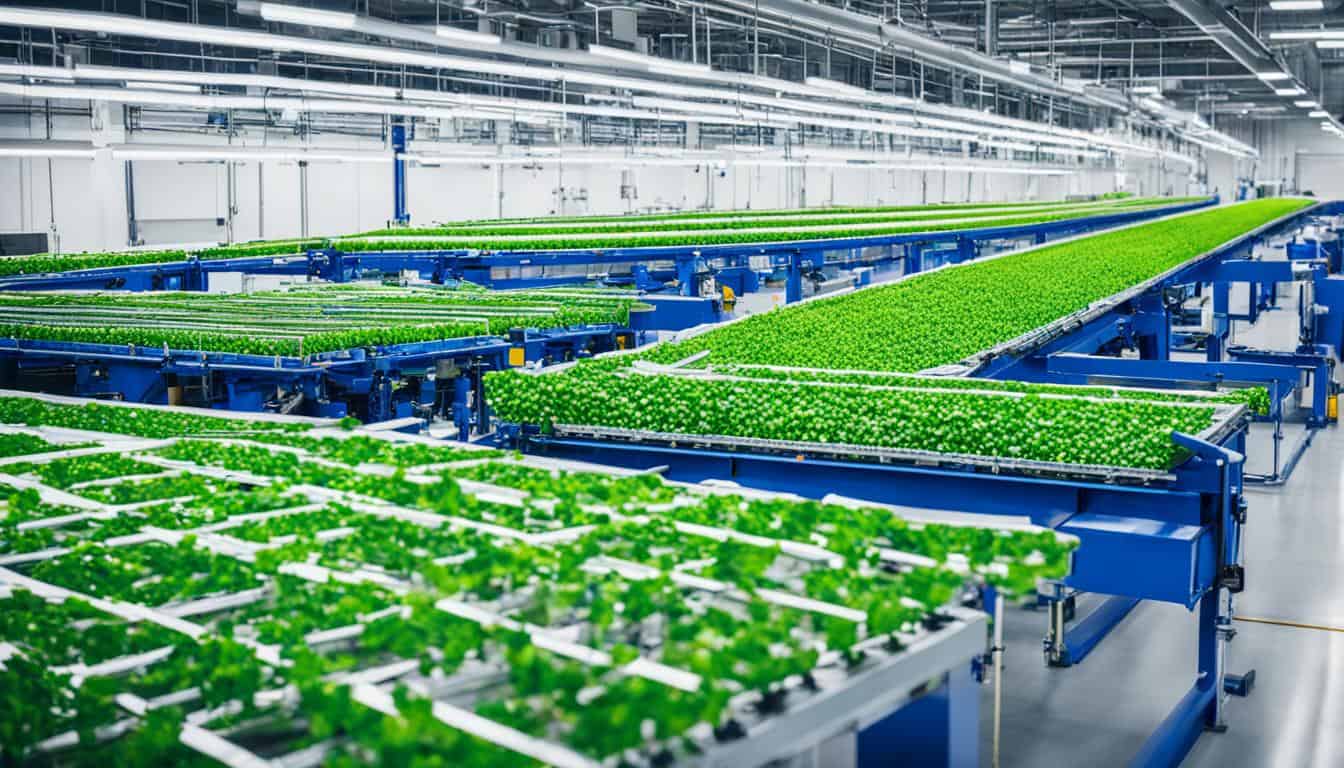With an unwavering commitment to a sustainable future, the University of Virginia (UVA) leads the charge in providing eco-friendly solutions for campus events. Compostable tableware plays a significant role in enabling the success of zero waste events and reducing the university’s environmental footprint. By adopting biodegradable products and environmentally-friendly practices, UVA is well on its way to achieving its ambitious waste reduction and sustainability goals.
As UVA dining facilities transition towards a more sustainable approach, campus events are following suit. This move allows the university community to actively participate in pushing the boundaries of innovation, change, and environmental stewardship. So, let’s look at compostable tableware for zero waste events!
Key Takeaways:
- UVA promotes the use of compostable tableware to achieve its zero-waste event goals.
- Biodegradable products play a crucial role in UVA’s waste reduction and sustainability initiatives.
- Environment-friendly practices are at the core of UVA dining efforts to reduce waste.
- Effective waste sorting processes are vital to maintaining the integrity of compostable materials.
- UVA’s dedication to sustainability extends beyond the campus, inspiring environmentally responsible decisions in the surrounding community.
- Education and communication are important elements in ensuring successful waste management at zero waste events.
- Achieving UVA’s sustainability goals requires active engagement from the university stakeholders.
The Importance of Reducing Waste at UVA: A Sustainability Goal
With the ambitious target of reducing its waste footprint by 70% by 2030, UVA has prioritized waste minimization as a major component of its sustainability plan. As of 2021, the University has made impressive strides, achieving a reduction of 39%. This progress is a testament to UVA’s commitment to its carbon neutral goal and an eagerness to develop a more environmentally responsible campus.
Integral to this mission are various strategies, including the reuse of items, recycling, and the use of composting and sustainable materials. UVA has implemented a ban on certain single-use plastics since mid-2021, helping to curb the negative impacts plastics have on the environment.
Events.com suggests: “Use reusable plates, silverware, and cups, but if your event isn’t suitable for reusable items, consider opting for compostable tableware”.
UVA’s sustainability team actively supports the campus community by providing resources and guidance for Zero Waste event planning, reinforcing the University’s commitment to environmentally sustainable practices.
“Our waste minimization efforts are a critical component of our sustainability goals. By banning single-use plastics and promoting composting and recycling, we can ensure a greener future for our community.”
- Reuse items whenever possible.
- Recycle a wide range of materials to help reduce waste.
- Choose compostable tableware for events to reduce the use of single-use plastics.
- Purchase sustainable materials to minimize the waste footprint.
| Year | Waste Footprint Reduction |
|---|---|
| 2010 | 0% |
| 2021 | 39% |
| 2030 (goal) | 70% |
As UVA continues on its journey toward waste minimization, the entire community plays a vital role in supporting these ongoing efforts. By adhering to and promoting environmentally sustainable practices, we can all contribute to a greener future for our campus.
Creating a Zero Waste Event: The Four Pillars
To support the creation of a Zero Waste Event at UVA, it is crucial to follow these four essential pillars: sourcing compostable wares, ensuring proper waste sorting and disposal, effectively communicating with event attendees, and preventing contamination. By effectively incorporating these elements into UVA events, sustainability practices and eco-friendly movements gain momentum on campus.
Compostable Wares: From Plates to Utensils
When organizing a Zero Waste Event, it is essential to select 100% compostable wares, such as plates, bowls, cups, and utensils. BPI certification is required as a standard of assurance. These compostable wares can be sourced from Zero Waste caterers on the America to Go website or obtained for smaller events through the online Zero Waste Event Request Form.
Sorting Made Simple: Appropriate Bins for Disposal
Implementing a properly sorted waste system is necessary for waste prevention. This includes procuring the appropriate disposal bins, involving ordering compost bins through UVA Recycling by using the Zero Waste Event Request Form and following the best practice of co-locating recycling and landfill bins alongside compost bins. This ensures that attendees can easily separate their waste, contributing to a successful zero waste station.
Effective Communication for Participant Engagement
To ensure effective waste sorting, communication is key. Announcements during events, utilizing promotional materials, and providing clear, visual signage above disposal bins ensure attendees are instructed on proper disposal methods. The Office for Sustainability offers signage support, making it easier for event organizers to communicate with participants.
Contamination Prevention: Ensuring Pure Compost
“Preventing contamination is essential to maintain the integrity of compostable waste.”
Strategies such as having dedicated Zero Waste volunteers monitor bins and educating attendees on what waste goes where can significantly reduce the risk of contamination. Co-locating recycling and landfill bins next to compost bins also aids in sorting and further assures waste prevention during UVA events. By adhering to these four pillars, event organizers can play a significant role in reducing waste and promoting sustainability practices at UVA.
Choosing Compostable Tableware: A Step Towards a Greener Event
When it comes to eco-friendly event planning, selecting compostable tableware is an integral step in reducing waste and enhancing sustainability. By choosing items that are both compostable and BPI certified, event planners can contribute positively to the waste reduction goals set by UVA, while ensuring their choices are environmentally responsible.
UVA Sustainability notes: “A large majority of your event’s waste stream will need to be compostable, including everything from plates to utensils to coffee cups.”
Embracing environmentally friendly options like compostable cups and compostable bowls not only promotes a greener event but also provides a viable alternative to traditional single-use plastics. These biodegradable products break down quickly and efficiently in composting facilities, leaving no harmful residue behind.

It is crucial to source BPI certified products to guarantee that these eco-friendly items meet strict regulations and industry standards. This certification ensures that compostables fully break down within a predetermined timeframe and that they are truly beneficial for the environment. With an array of options available in the market, here are some popular choices:
| Compostable Item | BPI Certified Brands |
|---|---|
| Plates and Bowls | Eco-Products, World Centric |
| Cups and Containers | Repurpose, Stalkmarket |
| Utensils | Greenmunch, Bambu |
| Napkins and Food Wraps | Seventh Generation, If You Care |
To further enhance your event’s green credibility, consider incorporating the following eco-friendly practices alongside the use of compostable tableware:
- Offer reusable water bottles for attendees in place of single-use plastic bottles.
- Encourage digital versions of handouts, agendas, and other materials, reducing the need for printed copies.
- Partner with local farmers and food providers to source organic and locally-sourced ingredients for event catering.
By opting for compostable tableware and embracing eco-friendly event planning principles, you can actively contribute to waste reduction goals and create a lasting positive impact on the environment.
Implementing Effective Waste Sorting: The Role of Recycling and Compost Bins
Effective waste sorting is paramount for a successful zero waste strategy and requires clear strategies and resources. Implementing a three-stream waste sorting system that includes recycling, composting, and landfill options is facilitated by UVA Recycling, which provides the necessary containers for proper waste disposal. Hand-sorted recycling processes and partnerships with composting facilities like Black Bear Composting further demonstrate the University’s systematic approach to waste reduction.
One essential aspect of waste sorting is the co-location of recycling, compost, and landfill bins to ensure that attendees can easily sort their waste items into the correct bins. Co-locating bins maximizes the efficiency of sorting processes, reduces contamination, and encourages a more environmentally conscious approach to waste management.
Sort, separate, and succeed: the mantra for implementing effective waste sorting on campus.
To make waste sorting even easier, here are some tips on placing and managing the different types of bins for a zero waste event:
- Compost bins: Place these bins in high-traffic areas where compostable items like food waste and compostable tableware will be readily available.
- Recycling bins: Locate these bins next to compost bins to ensure that recyclable materials (e.g., plastic bottles, cups, or aluminum cans) are correctly disposed of in the appropriate recycling bins.
- Landfill bins: Landfill bins should be placed near compost and recycling bins to encourage appropriate waste separation and discourage contamination.
By understanding the role of each type of bin and organizing them effectively at events, we can ensure that waste sorting processes are efficient and align with the University’s zero waste strategies.
| Bin Type | Items Accepted | Tips for Use |
|---|---|---|
| Compost Bins | Food waste, compostable tableware, napkins, paper towels, coffee grounds, tea bags | Place in areas where food is being served or consumed |
| Recycling Bins | Plastics, aluminum, glass, paper, cardboard | Co-locate with compost bins for easy access |
| Landfill Bins | Non-recyclable plastics, Styrofoam, chip bags, candy wrappers, disposable gloves | Place next to recycling and compost bins to encourage proper waste separation |
With the proper placement and management of compost, recycling, and landfill bins, we can facilitate efficient waste disposal and contribute to the University’s waste reduction efforts. Implementing effective waste sorting is an integral component of zero waste strategies on campus, ensuring that our events and daily activities align with the University’s sustainability goals.
Educational Communication: How to Guide Event Attendees
When it comes to ensuring successful waste management during events, it is essential to provide effective sustainability education and clear event communication to all attendees. In this section, we will discuss the different methods to guide event participants on proper waste disposal practices, from pre-event notifications to visual disposal bin markers.
- Pre-Event Notifications
Before the event, inform attendees of the waste sorting guidelines, composting awareness, and recycling instructions in place at the event. This can be done through emails, social media announcements, or inclusion in event programs. Early communication will help to create an environmentally aware community among event participants.
- Onsite Announcements
During the event, make periodic announcements to remind guests of the proper waste disposal practices. Encourage them to ask questions if they are unsure of where to place certain items. Onsite announcements are an effective way to reinforce waste separation guidelines in a friendly manner.
- Visual Disposal Bin Markers
Clearly label compost, recycling, and landfill bins at the event using bold, eye-catching signage. Ensure that the waste sorting guidelines are easily accessible and visible to attendees. Additionally, consider positioning a volunteer or staff member near the waste disposal area, providing assistance and guidance to attendees as needed.
By employing these educational communication techniques, event organizers can promote participant engagement and contribute to achieving the waste management goals set forth by the environmentally aware community.
| Communication Method | Description |
|---|---|
| Pre-Event Notifications | Inform attendees of waste disposal practices through emails, social media, or event programs. |
| Onsite Announcements | Provide friendly reminders during the event on proper composting, recycling, and landfill disposal practices. |
| Visual Disposal Bin Markers | Use bold, eye-catching signage to clearly label compost, recycling, and landfill bins. |
“Educational communication plays a pivotal role in guiding attendees on proper waste disposal practices. Pre-event notifications, clear onsite announcements, and well-marked disposal bins serve as effective tools in promoting participant engagement and ensuring successful waste management during events.”
Handling Non-Compostable Waste: What To Do with Recyclables and Landfill Items

While focusing on compostable products is essential, it is equally important to address the proper handling of non-compostable waste at UVA events. This includes correctly identifying recyclable and non-recyclable items and providing suitable disposal options.
Identifying Recyclable and Non-Recyclable Items
UVA’s recycling department emphasizes the significance of distinguishing between recyclable and non-recyclable materials to ensure efficient waste management. Organizers and volunteers must be well-informed about various items that can or cannot be recycled. Common recyclable materials include:
- Paper products
- Cardboard
- Plastic containers with recycling symbols
- Aluminum cans and foils
- Glass bottles and jars
On the other hand, typical non-recyclable items may include:
- Plastic bags and wraps
- Styrofoam products
- Disposables like diapers and tissues
- Food-soiled items
- Broken glassware
Efficient sorting of non-compostables involves the use of co-located bins for properly segregating items that are recyclable, compostable, or destined for landfill disposal. Signage and volunteer guidance are vital in preventing contamination and ensuring correct waste handling practices.
UVA emphasizes the importance of correctly identifying recyclable and non-recyclable items to manage non-compostable waste efficiently.
Implementing a systematic waste handling plan that addresses both compostable and non-compostable waste contributes significantly to the success of UVA’s zero waste events and its ultimate sustainability mission.
The Impact of Compostable Products on University Waste Reduction Goals

The use of compostable products significantly furthers UVA’s waste reduction goals, aligning with the University’s Sustainability Plan to reduce waste to 70% below 2010 levels by 2030. Transitioning to compostable products adheres to this commitment, harmonizing with the prohibition of single-use plastics and the introduction of more sustainable alternatives. In this section, we will examine the positive impact of compostable products on UVA’s waste minimization efforts and how they have become an integral part of the University’s waste initiatives.
- Compostable products as single-use plastic alternatives
By replacing single-use plastics with environmentally-friendly compostable products, UVA not only reduces plastic pollution but also decreases its carbon footprint. These compostable items, whether used in dining halls or at special events, contribute to the overall waste minimization goals and encourage a culture of sustainability within the university community.
- Compost service collaborations
UVA partners with local compost service providers to manage the compost generated from events, dining halls, and other university activities. These collaborations help divert a significant amount of waste from landfills and support the University’s waste reduction goals.
- Promoting a sustainable culture
Integrating compostable products into daily operations and events is an essential aspect of UVA’s waste initiatives. In doing so, the University encourages students, faculty, and staff to adopt sustainable practices and become environmentally conscious citizens, fostering a greener campus while contributing to its waste reduction goals.
“Transitioning to compostable products adheres to UVA’s commitment to waste reduction, harmonizing with the prohibition of single-use plastics and the introduction of more sustainable alternatives.”
As evident from the above points, compostable products play a vital role in UVA’s efforts toward waste minimization and adherence to its Sustainability Plan. Optimizing the use of these eco-friendly alternatives not only benefits the University but also sets a commendable example for other institutions to follow suit and make a lasting positive environmental impact.
Boosting Your Event’s Green Credibility with Compostable Solutions
Incorporating compostable solutions into event planning not only supports waste reduction, but also boosts an event’s green credibility, creating a lasting impression on attendees. The University of Virginia’s Zero Waste Events Guide provides ample resources and guidance for switching to eco-products and implementing sustainable event planning practices.
Choosing compostable serviceware is an effective way to demonstrate your commitment to reducing the environmental impact of your events. To help you make the transition, consider the following compostable solutions as part of your event planning strategy:
- Eco-friendly plates and bowls made from renewable resources such as sugarcane or bamboo
- Compostable cups, including hot and cold beverage cups, as well as innovative edible cups
- Utensils made from plant-based material, ensuring they are both sturdy and compostable
- Compostable napkins and tablecloths made from 100% recycled materials
Pro Tip: Before purchasing eco-products, always ensure they are BPI-certified to meet UVA’s compostability standards.
“UVA’s vision for sustaining a green credibility on campus is deeply rooted in the reduction of environmental impact through innovative compostable solutions and sustainable practices.”
By incorporating compostable serviceware and sustainable event planning practices, you are not only contributing to UVA’s short- and long-term waste reduction goals, but also setting an example for others to follow. Committing to green event planning is a powerful statement of your dedication to environmental responsibility and sustainability.
Conclusion on Single-Use Plastics
The University of Virginia (UVA) showcases its commitment to a sustainable future through its ambitious zero waste goals and plastic-free initiatives. By adopting compostable strategies and supporting environment-friendly practices, UVA aims at significantly reducing its waste footprint and promoting a greener campus culture.
Multi-faceted sustainability engagement plays a vital role in achieving UVA’s waste reduction targets. The university not only focuses on providing compostable tableware options, but also fosters educational communication and collaboration among its stakeholders to ensure the success of waste reduction endeavors.
In conclusion, understanding and embracing the importance of sustainable practices, including the use of compostable products, is crucial for every individual and organization, just as UVA has embraced its commitment to sustainability. By following the university’s example, we can contribute to a more environmentally responsible society and work towards a brighter, greener future for all.
FAQ on Compostable Tableware for Zero Waste Events
Q: What is the purpose of using compostable serviceware at UVA Sustainable’s zero waste events?
A: The objective is to reduce the waste generated at on-campus events, diverting most, if not all, waste from the landfill. Compostable serviceware, such as cutlery and silverware, decompose naturally, leaving minimal environmental impact.
Q: How can I request compostable cutlery and other serviceware for hosting a zero waste event?
A: You can request compostable serviceware for your events from UVA Marketplace. Please don’t hesitate to contact us if you need any assistance in the process.
Q: Are compostable serviceware available to all student groups or only certain ones?
A: We encourage all student groups to request compostable serviceware for their on-campus events. It’s an effective strategy towards achieving our zero waste goals.
Q: How can I ensure proper disposal of compostable serviceware during my event?
A: We’d recommend adding compost bins throughout your event. Have a designated zero waste volunteer keep an eye on the compost bins ensuring the correct item goes in each bin. Alternatively, place appropriate signages next to every compost bin for easy reference.
Q: Is there any special consideration when planning a zero waste event using compostable serviceware?
A: Yes, it’s essential to include a note on your promotional materials mentioning the event is a “zero waste event”. Make your attendees aware of the compostable tableware and cutlery well in advance so that they are prepared to dispose of things responsibly.
Q: How does compostable serviceware help in reducing waste generated at events?
A: Compostable serviceware is made from biodegradable materials. They break down into compostable materials, reducing the volume of waste heading to the landfill, and contribute to producing nutrient-rich compost for gardening and other uses.
Q: What steps should be taken to effectively manage larger events aiming for zero waste with compostable serviceware?
A: For larger events, it’s recommended to work closely with your event planning team and facilities management. Make sure they know the specifics about compostable serviceware disposal and its importance. Moreover, more compost bins might be needed, scattered evenly throughout the event location.
Q: Do I need to clean compostable serviceware before tossing them in the compost bins?
A: No, it’s not necessary. However, it’s good practice to avoid excessive contamination from food residue. Small amounts of organic residue is acceptable as it also composts.
Q: What should I do if I have more questions about hosting a zero waste event or need more information regarding compostable serviceware?
A: If you need further information or assistance in planning your zero waste event and using compostable serviceware, please don’t hesitate to contact us. We are here to assist you in any possible way.
Q: Do compostable serviceware cost more than regular tableware?
A: Yes, compostable serviceware may sometimes cost more than standard service items. However, the environmental benefits of using these items justify the extra cost. Plus, the costs contribute to the overall sustainability of your event and the university’s comprehensive waste reduction efforts.





Leave a Reply